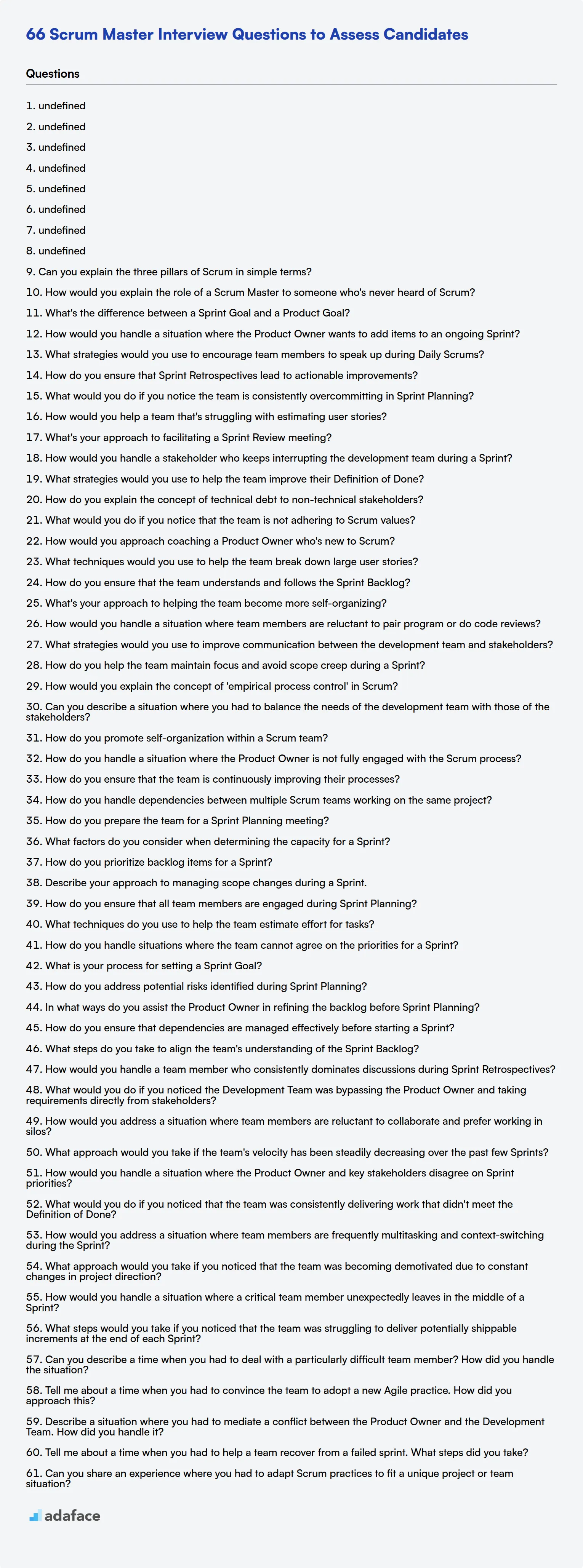Hiring the right Scrum Master is crucial for the success of any agile team. Knowing which questions to ask during interviews can help you identify candidates with the necessary skills and experience to excel in this role.
This blog post provides a comprehensive list of Scrum Master interview questions, covering general topics, junior-level assessments, agile methodologies, sprint planning, situational scenarios, and behavioral inquiries. These questions are designed to help interviewers evaluate candidates' knowledge, problem-solving abilities, and leadership potential.
By using these questions, you can make more informed hiring decisions and find Scrum Masters who will drive your team's productivity and success. Consider combining these interview questions with a pre-employment Scrum Master assessment to get a well-rounded view of each candidate's capabilities.
Table of contents
8 general Scrum Master interview questions and answers to assess candidates
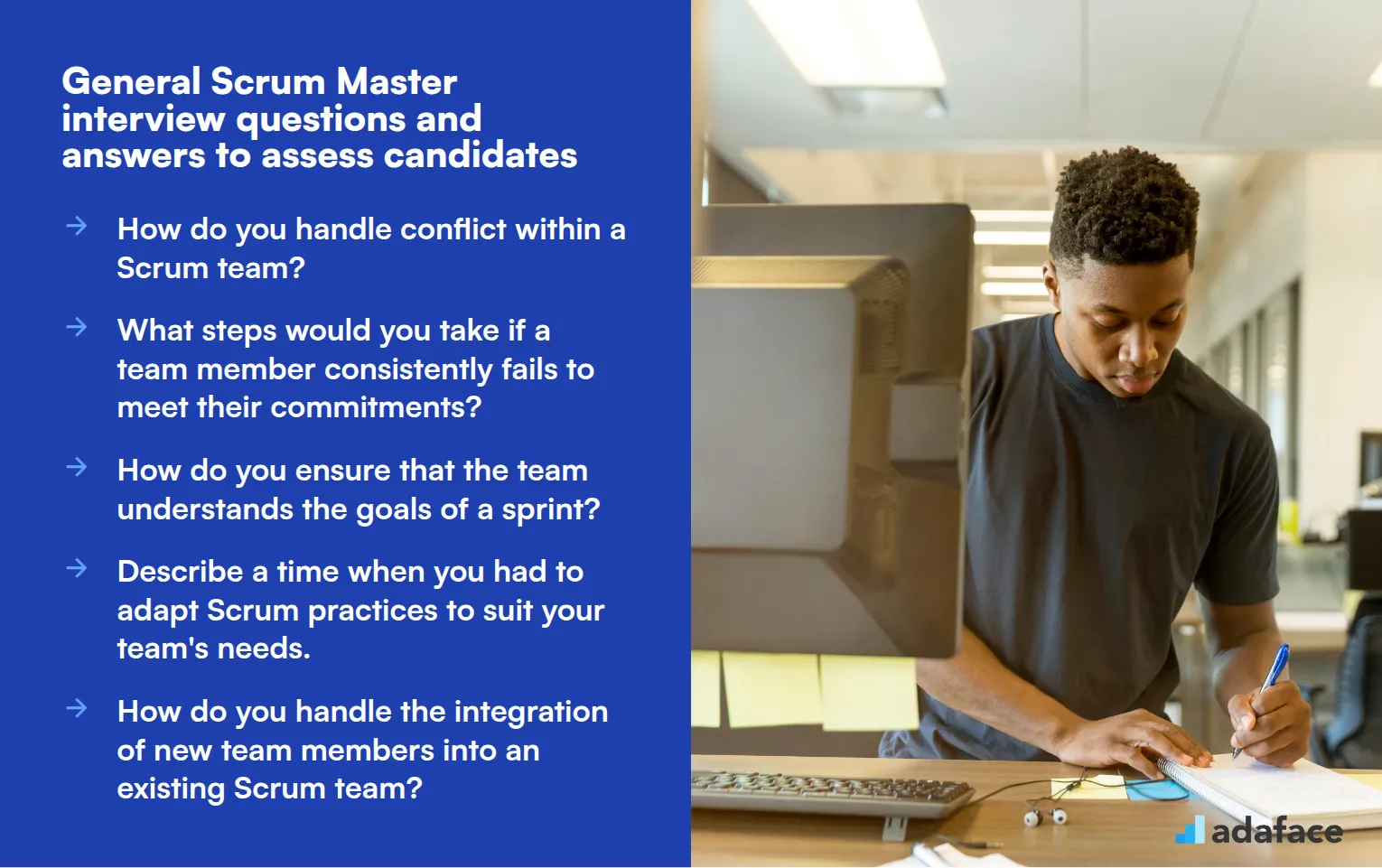
To make sure your Scrum Master candidates have what it takes to keep your team running like a well-oiled machine, use these questions to dig deep into their skills and experience. Whether you're assessing their approach to collaboration or their problem-solving prowess, these queries will help you identify the best fit for your team.
1. How do you handle conflict within a Scrum team?
Conflict is inevitable in any team, but a good Scrum Master knows how to navigate it effectively. They should focus on open communication and encourage team members to express their concerns.
An ideal candidate would mention strategies like setting up a neutral ground for discussion and facilitating team agreements. They might also emphasize the importance of maintaining a positive environment where everyone feels heard.
2. What steps would you take if a team member consistently fails to meet their commitments?
Addressing unmet commitments involves first understanding the root cause. A Scrum Master should have a one-on-one conversation with the team member to identify any obstacles they may be facing.
A strong candidate will discuss creating an action plan that includes support mechanisms, like mentoring or additional resources, to help the team member improve. Look for answers that focus on constructive feedback and fostering a growth mindset.
3. How do you ensure that the team understands the goals of a sprint?
A clear understanding of the sprint goals is vital for success. A Scrum Master should facilitate effective sprint planning meetings where goals are clearly articulated and understood by all team members.
Candidates should mention using visual aids or sprint boards to track progress and keep goals visible. They might also highlight the use of regular check-ins to ensure alignment and address any confusion promptly.
4. Describe a time when you had to adapt Scrum practices to suit your team's needs.
Flexibility in applying Scrum practices can be crucial to a team's success. The candidate should describe a specific situation where they customized a practice to better fit the team’s context, such as adjusting the length of sprints or modifying daily stand-ups.
Look for responses that show a deep understanding of Scrum principles and the ability to maintain the framework's integrity while making necessary adjustments for team efficiency.
5. How do you handle the integration of new team members into an existing Scrum team?
Onboarding new team members can be challenging. A Scrum Master should ensure that new arrivals are welcomed and provided with all necessary information about the team's dynamics and processes.
Candidates should discuss setting up a buddy system or arranging introductory sessions to help newcomers acclimate quickly. They may also emphasize the importance of gradually involving them in ongoing projects to foster a sense of belonging.
6. What techniques do you use to measure team performance and progress?
Measuring team performance involves using both qualitative and quantitative metrics. A Scrum Master might use burndown charts, velocity tracking, and sprint reviews as tools to gauge progress.
Ideal answers should include a mix of data-driven insights and feedback from retrospectives. Candidates should mention how they use these insights to drive continuous improvement and enhance team dynamics.
7. How do you facilitate collaboration between remote Scrum teams?
Remote collaboration comes with its own set of challenges. A Scrum Master needs to leverage digital tools like video conferencing, chat apps, and shared documents to keep everyone connected.
Candidates should discuss setting up regular virtual meetings, ensuring time zones are respected, and promoting a culture of transparency. Look for responses that emphasize maintaining strong communication channels and team engagement.
8. What do you do to maintain your own skills and knowledge as a Scrum Master?
Continuous learning is crucial for a Scrum Master. They should engage in professional development activities like attending workshops, participating in Scrum Master communities, or pursuing certifications.
The best candidates will also mention reading industry publications or listening to podcasts. Their answer should reflect a commitment to staying updated on Agile trends and best practices.
20 Scrum Master interview questions to ask junior Scrum Masters
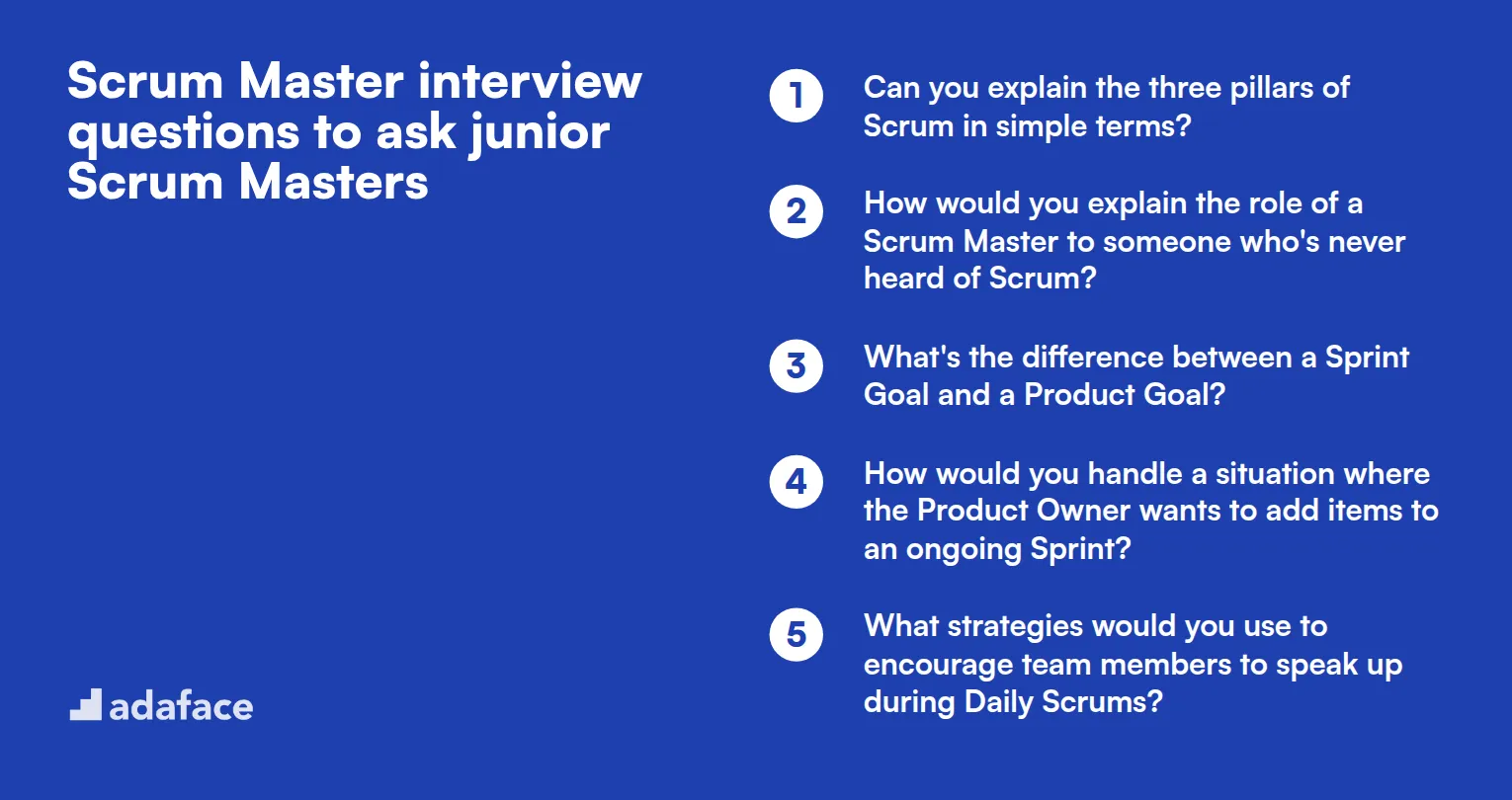
When interviewing junior Scrum Masters, it's crucial to assess their understanding of Scrum fundamentals and their ability to apply these concepts in real-world scenarios. The following questions will help you gauge a candidate's potential and readiness for the role, focusing on their knowledge of Scrum principles and their approach to common challenges faced by new Scrum Masters.
- Can you explain the three pillars of Scrum in simple terms?
- How would you explain the role of a Scrum Master to someone who's never heard of Scrum?
- What's the difference between a Sprint Goal and a Product Goal?
- How would you handle a situation where the Product Owner wants to add items to an ongoing Sprint?
- What strategies would you use to encourage team members to speak up during Daily Scrums?
- How do you ensure that Sprint Retrospectives lead to actionable improvements?
- What would you do if you notice the team is consistently overcommitting in Sprint Planning?
- How would you help a team that's struggling with estimating user stories?
- What's your approach to facilitating a Sprint Review meeting?
- How would you handle a stakeholder who keeps interrupting the development team during a Sprint?
- What strategies would you use to help the team improve their Definition of Done?
- How do you explain the concept of technical debt to non-technical stakeholders?
- What would you do if you notice that the team is not adhering to Scrum values?
- How would you approach coaching a Product Owner who's new to Scrum?
- What techniques would you use to help the team break down large user stories?
- How do you ensure that the team understands and follows the Sprint Backlog?
- What's your approach to helping the team become more self-organizing?
- How would you handle a situation where team members are reluctant to pair program or do code reviews?
- What strategies would you use to improve communication between the development team and stakeholders?
- How do you help the team maintain focus and avoid scope creep during a Sprint?
7 Scrum Master interview questions and answers related to agile methodologies
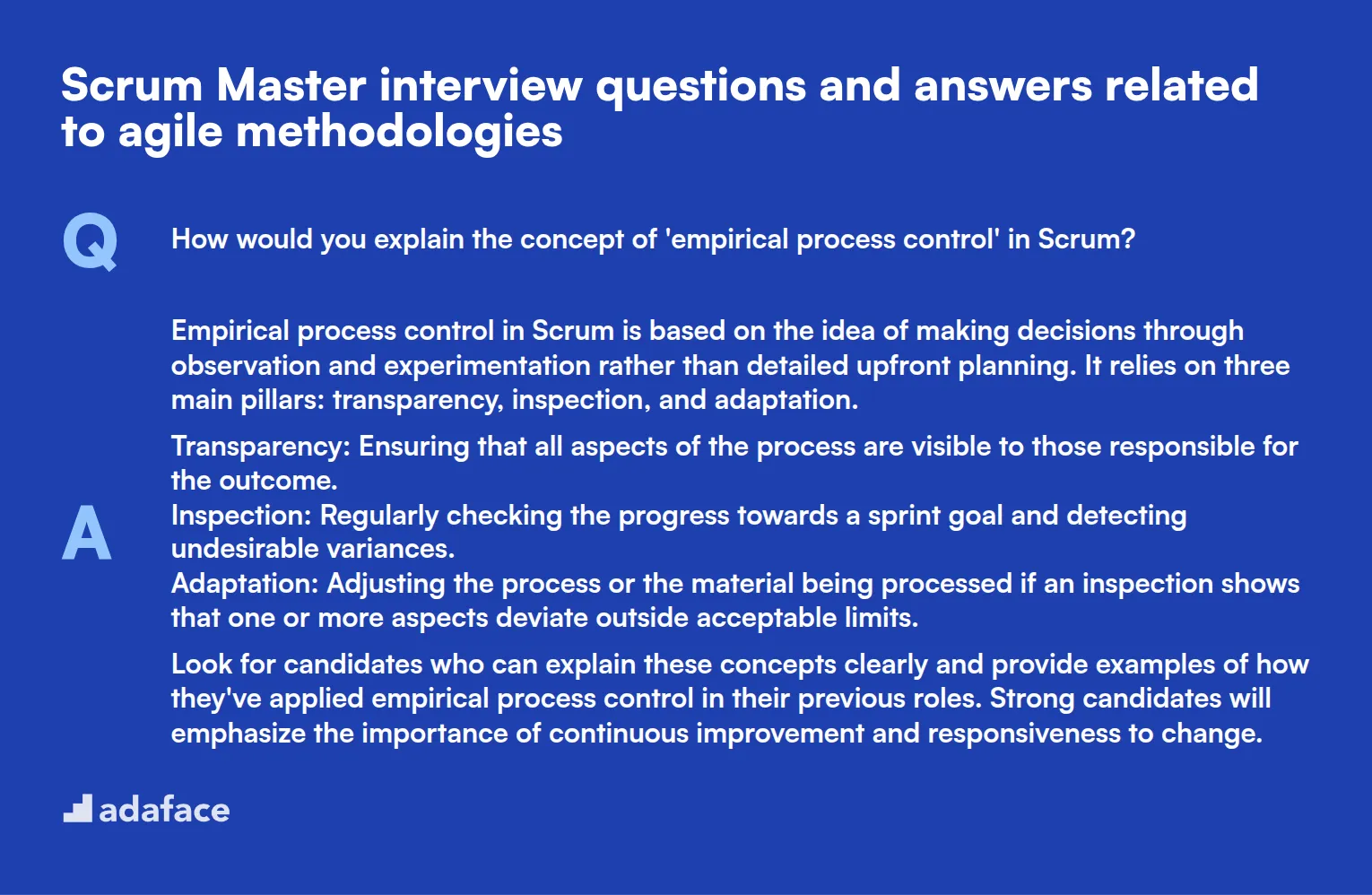
When interviewing for a Scrum Master position, it's crucial to assess the candidate's understanding of agile methodologies. These questions will help you gauge their knowledge and experience in implementing agile practices. Use them to evaluate candidates effectively and find the right fit for your team.
1. How would you explain the concept of 'empirical process control' in Scrum?
Empirical process control in Scrum is based on the idea of making decisions through observation and experimentation rather than detailed upfront planning. It relies on three main pillars: transparency, inspection, and adaptation.
- Transparency: Ensuring that all aspects of the process are visible to those responsible for the outcome.
- Inspection: Regularly checking the progress towards a sprint goal and detecting undesirable variances.
- Adaptation: Adjusting the process or the material being processed if an inspection shows that one or more aspects deviate outside acceptable limits.
Look for candidates who can explain these concepts clearly and provide examples of how they've applied empirical process control in their previous roles. Strong candidates will emphasize the importance of continuous improvement and responsiveness to change.
2. Can you describe a situation where you had to balance the needs of the development team with those of the stakeholders?
A strong answer to this question should demonstrate the candidate's ability to manage competing priorities and facilitate effective communication between different groups. Listen for examples that show:
- Clear understanding of both the development team's constraints and the stakeholders' expectations
- Effective negotiation and conflict resolution skills
- Creative problem-solving to find win-win solutions
- Use of data and metrics to support decision-making
The ideal candidate will describe how they acted as a bridge between the development team and stakeholders, perhaps by organizing additional sprint reviews, setting up informal feedback sessions, or finding ways to demonstrate progress more frequently. They should also mention how they educated stakeholders about the Scrum process and managed expectations effectively.
3. How do you promote self-organization within a Scrum team?
Promoting self-organization is a key responsibility of a Scrum Master. A strong candidate should be able to describe various techniques they've used, such as:
- Encouraging team members to volunteer for tasks rather than assigning them
- Facilitating team decision-making processes
- Providing the team with the tools and information they need to make informed decisions
- Stepping back and allowing the team to solve problems on their own
- Coaching team members on how to take initiative and be proactive
Look for candidates who emphasize the importance of creating a safe environment where team members feel comfortable taking risks and making decisions. They should also mention how they handle situations where the team struggles with self-organization, perhaps by providing additional guidance or training as needed.
4. How do you handle a situation where the Product Owner is not fully engaged with the Scrum process?
This question tests the candidate's ability to manage challenging situations and work effectively with different personalities. A strong answer might include:
- Scheduling regular one-on-one meetings with the Product Owner to understand their challenges and concerns
- Educating the Product Owner on the importance of their role in the Scrum process
- Helping the Product Owner to prioritize their workload and manage their time more effectively
- Facilitating better communication between the Product Owner and the development team
- Escalating the issue to senior management if necessary, while maintaining a constructive approach
Look for candidates who demonstrate diplomacy, patience, and a focus on finding solutions rather than assigning blame. They should also show an understanding of the Product Owner's role and its importance to the success of Scrum projects.
5. How do you ensure that the team is continuously improving their processes?
Continuous improvement is a core principle of Scrum and agile methodologies. A strong candidate should describe a multi-faceted approach, which might include:
- Facilitating effective Sprint Retrospectives, ensuring they lead to actionable improvements
- Encouraging the team to experiment with new techniques or tools
- Regularly reviewing and updating the team's Definition of Done
- Using metrics to track team performance and identify areas for improvement
- Promoting a culture of open feedback and continuous learning
Look for candidates who emphasize the importance of creating a safe environment where team members feel comfortable discussing challenges and suggesting improvements. They should also mention how they follow up on improvement ideas to ensure they're implemented and evaluated for effectiveness.
6. How do you handle dependencies between multiple Scrum teams working on the same project?
Managing dependencies between Scrum teams is a common challenge in larger organizations. A strong answer might include strategies such as:
- Implementing Scrum of Scrums or other scaled agile frameworks to facilitate communication between teams
- Using visual management tools (like Kanban boards) to make dependencies visible
- Encouraging cross-team collaboration and knowledge sharing
- Coordinating sprint planning and reviews across teams to align on shared goals and timelines
- Working with Product Owners to manage the product backlog in a way that minimizes dependencies
Look for candidates who demonstrate an understanding of the complexities involved in multi-team projects. They should emphasize the importance of clear communication, proactive planning, and flexibility in managing dependencies. Strong candidates might also mention techniques for breaking down work to minimize dependencies or strategies for resolving conflicts between teams.
12 Scrum Master questions related to sprint planning
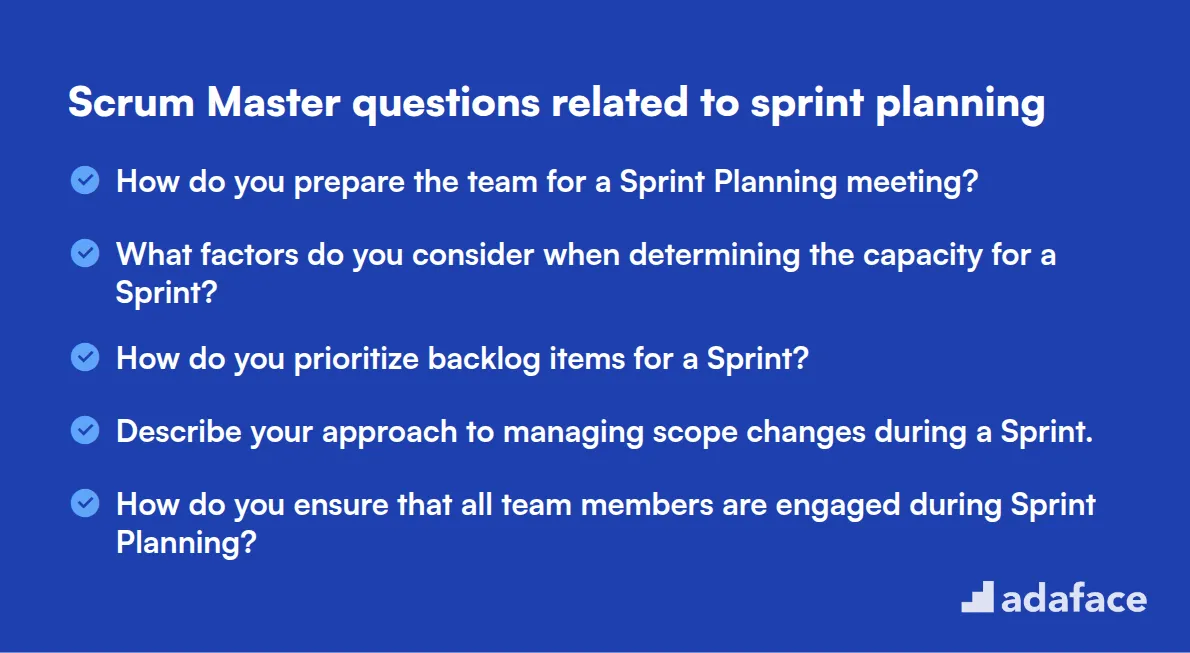
To effectively evaluate a candidate's ability to plan and execute sprints, these Scrum Master interview questions are essential. They help recruiters and hiring managers understand how well a candidate can organize, prioritize, and facilitate successful Sprint Planning sessions.
- How do you prepare the team for a Sprint Planning meeting?
- What factors do you consider when determining the capacity for a Sprint?
- How do you prioritize backlog items for a Sprint?
- Describe your approach to managing scope changes during a Sprint.
- How do you ensure that all team members are engaged during Sprint Planning?
- What techniques do you use to help the team estimate effort for tasks?
- How do you handle situations where the team cannot agree on the priorities for a Sprint?
- What is your process for setting a Sprint Goal?
- How do you address potential risks identified during Sprint Planning?
- In what ways do you assist the Product Owner in refining the backlog before Sprint Planning?
- How do you ensure that dependencies are managed effectively before starting a Sprint?
- What steps do you take to align the team's understanding of the Sprint Backlog?
10 situational Scrum Master interview questions for hiring top Scrum Masters
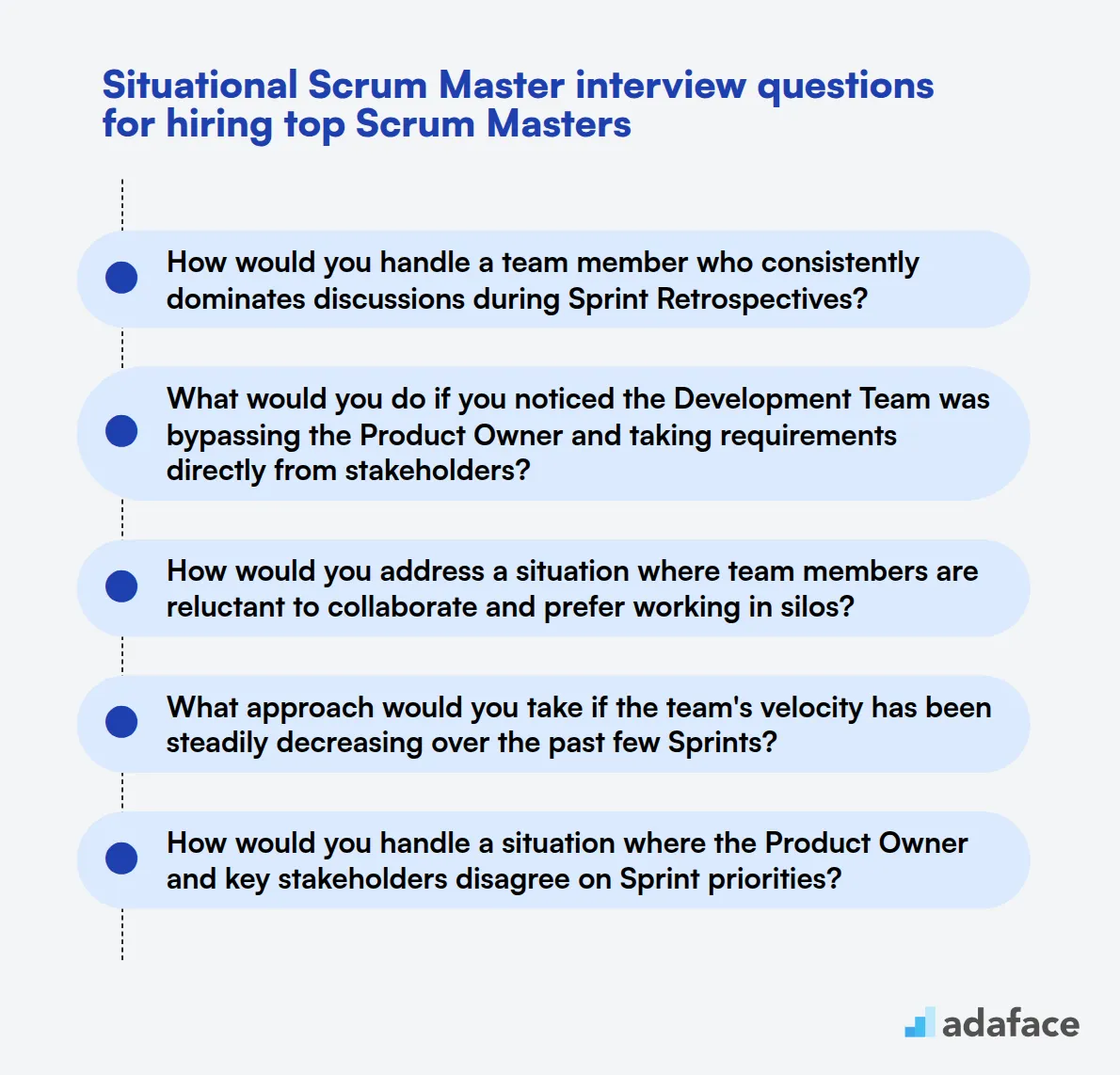
To assess a candidate's ability to handle real-world Scrum Master scenarios, use these situational interview questions. They help evaluate problem-solving skills, adaptability, and practical knowledge of Scrum principles in action.
- How would you handle a team member who consistently dominates discussions during Sprint Retrospectives?
- What would you do if you noticed the Development Team was bypassing the Product Owner and taking requirements directly from stakeholders?
- How would you address a situation where team members are reluctant to collaborate and prefer working in silos?
- What approach would you take if the team's velocity has been steadily decreasing over the past few Sprints?
- How would you handle a situation where the Product Owner and key stakeholders disagree on Sprint priorities?
- What would you do if you noticed that the team was consistently delivering work that didn't meet the Definition of Done?
- How would you address a situation where team members are frequently multitasking and context-switching during the Sprint?
- What approach would you take if you noticed that the team was becoming demotivated due to constant changes in project direction?
- How would you handle a situation where a critical team member unexpectedly leaves in the middle of a Sprint?
- What steps would you take if you noticed that the team was struggling to deliver potentially shippable increments at the end of each Sprint?
9 behavioral Scrum Master interview questions and answers
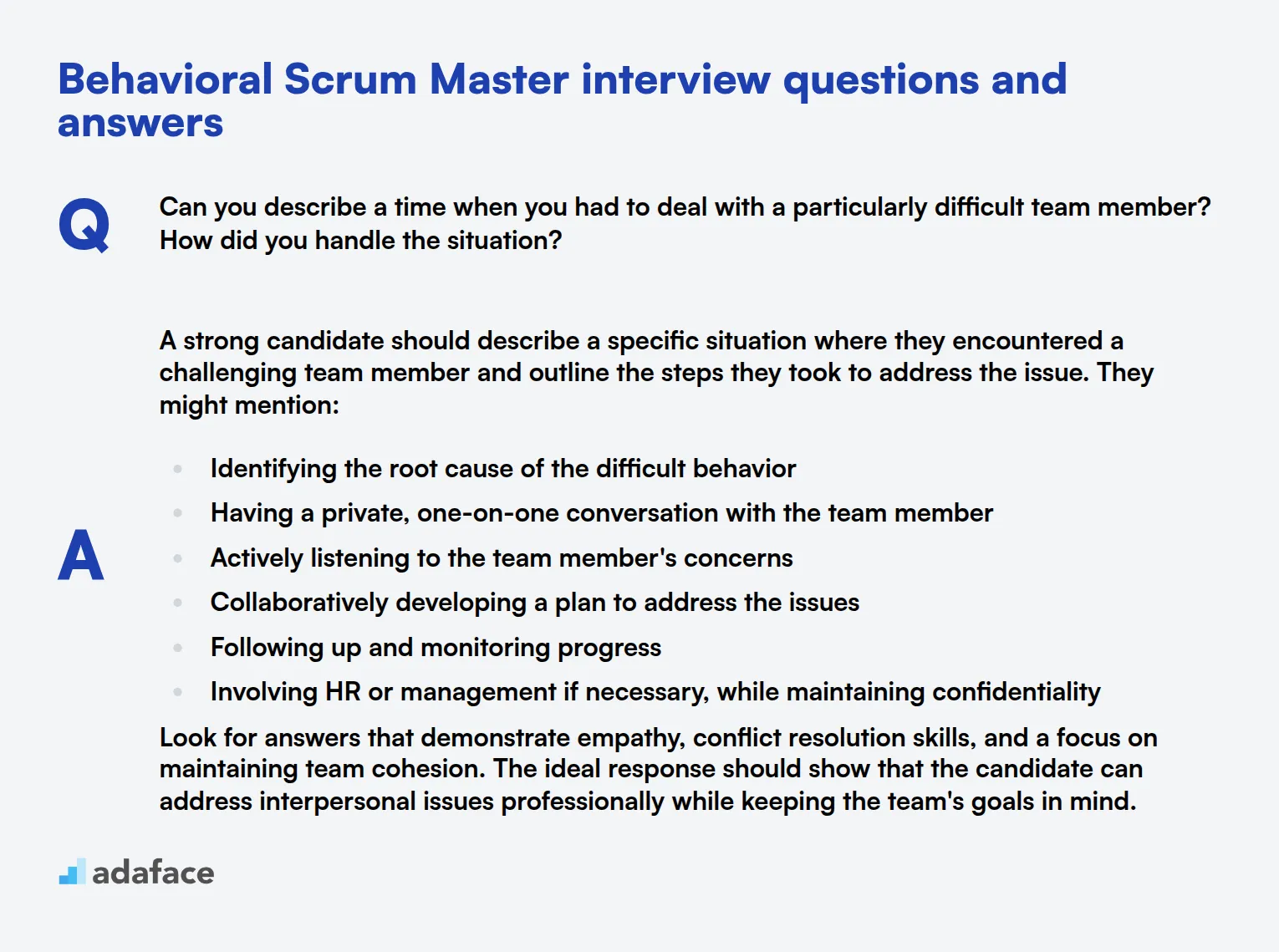
Behavioral questions are crucial for assessing a Scrum Master's soft skills and real-world problem-solving abilities. These questions help hiring managers evaluate how candidates have handled past situations, providing insights into their leadership style, communication skills, and adaptability. Use this curated list of behavioral questions to dig deeper into a candidate's experience and uncover their true potential as a Scrum Master.
1. Can you describe a time when you had to deal with a particularly difficult team member? How did you handle the situation?
A strong candidate should describe a specific situation where they encountered a challenging team member and outline the steps they took to address the issue. They might mention:
- Identifying the root cause of the difficult behavior
- Having a private, one-on-one conversation with the team member
- Actively listening to the team member's concerns
- Collaboratively developing a plan to address the issues
- Following up and monitoring progress
- Involving HR or management if necessary, while maintaining confidentiality
Look for answers that demonstrate empathy, conflict resolution skills, and a focus on maintaining team cohesion. The ideal response should show that the candidate can address interpersonal issues professionally while keeping the team's goals in mind.
2. Tell me about a time when you had to convince the team to adopt a new Agile practice. How did you approach this?
An experienced Scrum Master should be able to describe a situation where they successfully introduced a new Agile practice to their team. A good answer might include:
- Identifying a specific need or problem that the new practice would address
- Researching and selecting an appropriate Agile practice
- Presenting the benefits of the new practice to the team
- Addressing concerns and resistance from team members
- Implementing the practice gradually, perhaps starting with a pilot or trial period
- Gathering feedback and making adjustments as needed
- Measuring and sharing the positive impact of the new practice
Pay attention to how the candidate balances being a change agent with respecting the team's autonomy. Look for signs of effective communication skills, persuasion abilities, and a data-driven approach to process improvement.
3. Describe a situation where you had to mediate a conflict between the Product Owner and the Development Team. How did you handle it?
A skilled Scrum Master should be able to recall a specific instance of conflict mediation between key stakeholders. A strong answer might include:
- Identifying the core issue causing the conflict
- Arranging a meeting with both parties to discuss the problem
- Facilitating open and respectful communication
- Helping both sides understand each other's perspectives
- Guiding the conversation towards finding a mutually beneficial solution
- Ensuring that Scrum values and principles are upheld throughout the process
- Following up to ensure the resolution sticks and prevent future conflicts
Look for candidates who demonstrate impartiality, strong communication skills, and the ability to navigate complex interpersonal dynamics. The ideal response should show how the candidate can maintain a balance between different stakeholders while keeping the project's goals in focus.
4. Tell me about a time when you had to help a team recover from a failed sprint. What steps did you take?
An experienced Scrum Master should be able to describe a specific instance where they helped a team bounce back from a failed sprint. A comprehensive answer might include:
- Conducting a thorough sprint retrospective to identify the root causes of the failure
- Encouraging open and honest communication within the team
- Helping the team identify actionable improvements
- Working with the Product Owner to reassess and potentially adjust sprint goals
- Implementing changes to the team's processes or practices
- Providing extra support or coaching where needed
- Monitoring the next sprint closely and celebrating small wins to rebuild morale
Pay attention to how the candidate approaches failure as a learning opportunity. Look for signs of resilience, problem-solving skills, and the ability to motivate a team through challenging times. The ideal response should demonstrate how the candidate can turn a setback into an opportunity for team growth and improvement.
5. Can you share an experience where you had to adapt Scrum practices to fit a unique project or team situation?
A proficient Scrum Master should be able to recall a specific instance where they tailored Scrum practices to meet unique project or team needs. A strong answer might include:
- Identifying the specific challenge or constraint that required adaptation
- Explaining the standard Scrum practice and why it needed modification
- Describing the adapted approach and how it was implemented
- Discussing how the team was involved in the decision-making process
- Outlining the results of the adaptation, including any measurable improvements
- Reflecting on lessons learned and how the experience informed future adaptations
Look for candidates who demonstrate flexibility, critical thinking, and a deep understanding of Agile principles. The ideal response should show that the candidate can adapt practices while still maintaining the core values of Scrum. Pay attention to how they balance adherence to Scrum framework with pragmatic problem-solving.
Which Scrum Master skills should you evaluate during the interview phase?
A single interview may not reveal everything about a candidate, but identifying the right skills can significantly aid in selecting a competent Scrum Master. Certain skills are crucial for a Scrum Master's role, as they ensure the team's success in agile environments. Here, we'll explore core competencies to focus on during interviews.
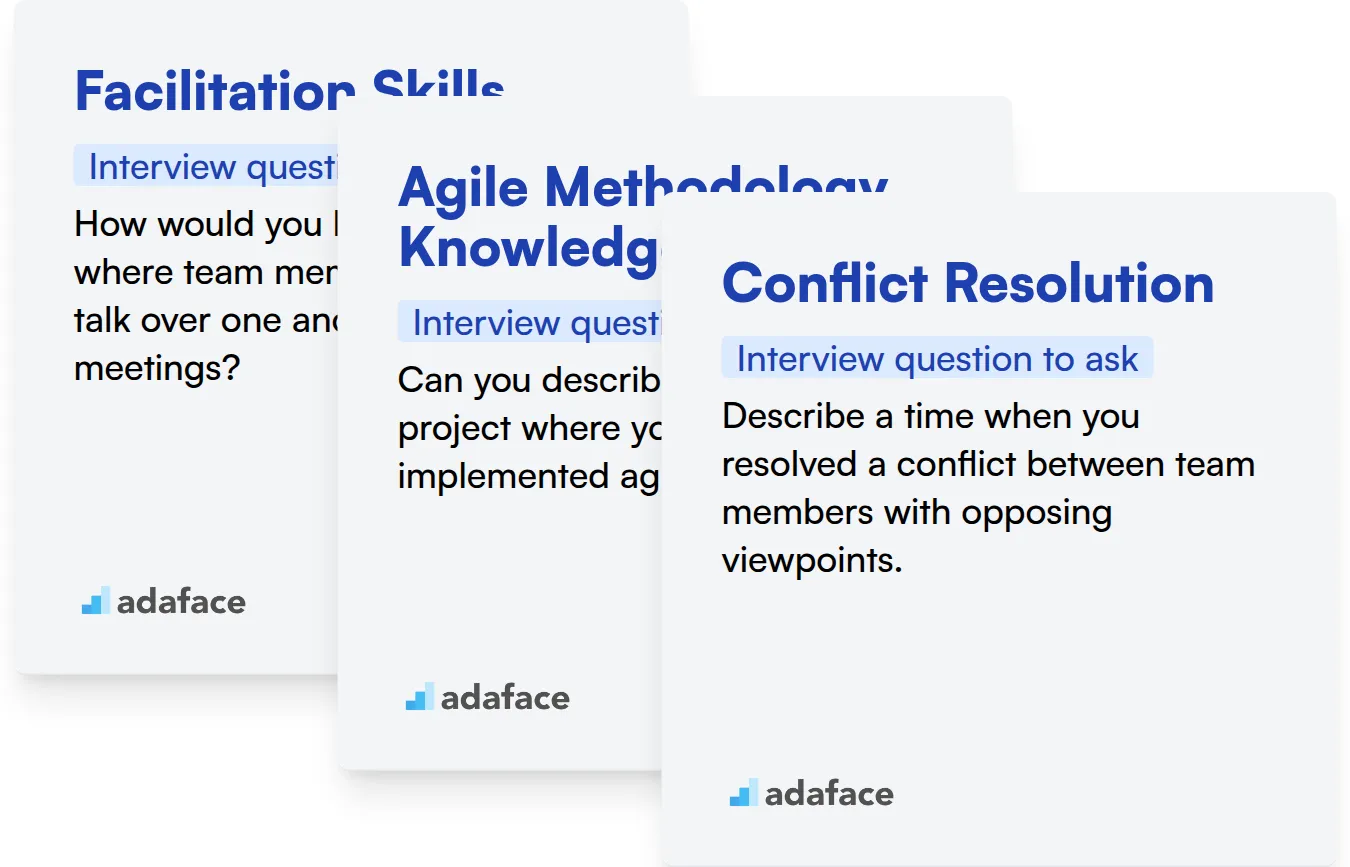
Facilitation Skills
To assess facilitation abilities, you can use an assessment test that includes relevant MCQs, such as our Agile/Scrum test.
You can also ask targeted questions to gauge a candidate's facilitation skills in real scenarios.
How would you handle a situation where team members consistently talk over one another during meetings?
When asking this question, look for responses that demonstrate an understanding of team dynamics and techniques for ensuring balanced participation.
Agile Methodology Knowledge
Consider leveraging an agile assessment test to filter candidates based on their understanding of agile methods.
To further evaluate agile knowledge, pose questions that reveal how candidates have applied agile practices in previous roles.
Can you describe a challenging project where you successfully implemented agile practices?
Evaluate candidates on how they identify challenges and adapt agile methodologies to fit different project needs.
Conflict Resolution
Pose questions during the interview that assess the candidate's ability to navigate and resolve conflicts.
Describe a time when you resolved a conflict between team members with opposing viewpoints.
Watch for answers that show the candidate's approach to understanding different perspectives and achieving amicable solutions.
Hiring the Best Scrum Master Candidates with Adaface
If you're looking to hire a Scrum Master, it's important to ensure they possess the right skills for your team. Assessing these skills accurately is key to making the right hiring decision.
One of the most reliable ways to identify these skills is by using skill tests. Consider using the Scrum Master Test from Adaface to assess a candidate's capabilities effectively.
After using this test, you can shortlist the most promising candidates and invite them for interviews. This approach ensures you're speaking with applicants who have already demonstrated their proficiency.
To get started with Adaface, head over to our online assessment platform and sign up to explore our wide range of assessment tools.
Scrum Master Test
Download Scrum Master interview questions template in multiple formats
Scrum Master Interview Questions FAQs
A Scrum Master facilitates Scrum practices in agile projects, ensuring the team follows agile principles and processes.
Ask them about their experience with different Scrum teams, challenges faced, and solutions implemented to assess their problem-solving skills.
They help evaluate how candidates might handle real-world scenarios, offering insight into their decision-making and leadership skills.
Behavioral questions reveal past behavior and achievements, shedding light on how candidates may perform in future roles.
Focus on agile methodologies, sprint planning, team facilitation, and conflict resolution to assess the candidate comprehensively.

40 min skill tests.
No trick questions.
Accurate shortlisting.
We make it easy for you to find the best candidates in your pipeline with a 40 min skills test.
Try for freeRelated posts
Free resources




